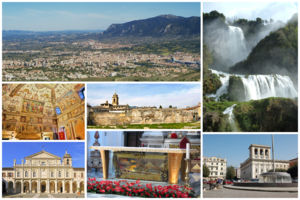Terni | |
|---|---|
| Comune di Terni | |
 From top left, anti-clockwise: view of Terni; City Council Hall; Terni Cathedral; Relics of Saint Valentine; Piazza Tacito; and Marmore Waterfalls. In the middle: Anfiteatro Fausto. | |
| Coordinates: 42°33′43″N 12°38′29″E / 42.56194°N 12.64139°E | |
| Country | Italy |
| Region | Umbria |
| Province | Terni (TR) |
| Frazioni | Acquapalombo, Appecano, Battiferro, Cecalocco, Cesi, Collegiacone, Collescipoli, Collestatte, Giuncano Alto, Giuncano Scalo, Marmore, Miranda, Papigno, Piediluco, Poggio Lavarino, Polenaco, Porzano, Pracchia, Rocca San Zenone, San Carlo, San Liberatore, Titurano, Torreorsina |
| Government | |
| • Mayor | Stefano Bandecchi |
| Area | |
| • Total | 211.9 km2 (81.8 sq mi) |
| Elevation | 130 m (430 ft) |
| Population (31 July 2023)[2] | |
| • Total | 106,065 |
| • Density | 500/km2 (1,300/sq mi) |
| Demonym | Ternani |
| Time zone | UTC+1 (CET) |
| • Summer (DST) | UTC+2 (CEST) |
| Postal code | 05100 |
| Dialing code | 0744 |
| Patron saint | Saint Valentine |
| Saint day | February 14 |
| Website | Official website |
Terni (/ˈtɛərni/ TAIR-nee; Italian: [ˈtɛrni] ; Latin: Interamna (Nahars)) is a city in the southern portion of the region of Umbria, in Central Italy. It is near the border with Lazio. The city is the capital of the province of Terni, located in the plain of the River Nera. It is 104 kilometres (65 miles) northeast of Rome and 81 km south of the regional capital, Perugia.
The Latin name means "between-two-rivers", in reference to its location on the confluence of the Nera river (Ancient Umbrian Nahar, Latin: Nār, Nahar) and the Serra stream. When disambiguation was needed, it was referred to as Interamna Nahars.[3] Its inhabitants were known in Latin as Interamnātēs Na(ha)rtēs.[4]
Interamna was founded as an Ancient Roman town, albeit settlements in the Terni area well precede this occurrence. During the 19th century, steel mills were introduced and led the city to have a role in the Second Industrial Revolution in Italy. Because of its industrial importance, the city was heavily bombed during World War II by the Allies. It remains an industrial hub and has been nicknamed "The Steel City".
Terni is also known as the "City of Lovers", as its patron saint, Saint Valentine, was born and became a bishop here, and the remains are preserved in the basilica-sanctuary in his honour.
- ^ "Superficie di Comuni Province e Regioni italiane al 9 ottobre 2011". Italian National Institute of Statistics. Retrieved 16 March 2019.
- ^ "Popolazione Residente al 1° Gennaio 2018". Italian National Institute of Statistics. Retrieved 16 March 2019.
- ^ CIL XI 4213
- ^ Uggeri, Giovanni (Florence); Buonocore, Marco (Rome) (2006-10-01). "Interamna". Brill's New Pauly.




